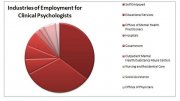
Forensic Psychologists apply psychology to criminal justice. Although similar in some aspects, forensic psychology is different than forensic science. One major difference is that forensic psychologists look deep into the immense psychological perspectives associated with the crime and apply them to the case so that justice might be served. They frequently deal with legal issues such as news law, and public policies, and are asked to determine the mental state and competency of the defendant at the time of the crime, and throughout the legal proceedings. Each of these issues blends law topics and psychology together, and is essential to the field of Forensic Psychology. Forensic Psychologists also use their knowledge of psychology to analyze a criminal’s mind and intent, treat mentally ill offenders, practice within the civil arena, and consult with attorneys.
Very few academic institutions offer degrees specifically focused on Forensic Psychology. Therefore, individuals who are interested in pursuing a career in Forensic Psychology should take an academic course load centered on criminal justice and psychology classes. Other classes that help prepare students for the field of Forensic Psychology include: cognitive, clinical, criminal investigative, social, and developmental psychology.
Some forensic psychologists choose to focus their careers exclusively on research, which ranges anywhere from learning how to improve interrogation methods to the detailed assessment of eyewitness testimony. Public policy is another area of interest for forensic psychologists. In this line work forensic psychologists act as researchers helping to design prisons and other correctional facilities. Most often Forensic Psychology includes areas between the conventional options of criminal justice (i.e, law enforcement, academic training, and corrections).
Most positions within this specialized area require more than a bachelor’s degree to be successful. In fact, a doctoral degree is required in order to become a licensed psychologist. For those interested in perusing a career in Forensic Psychology, there are some important undergraduate classes that should be taken. These include: statistics, criminology, abnormal psychology, social psychology, and criminal law. One of the most valuable classes an undergraduate student could take would be motivational psychology. It’s helpful for students to understand the motivation behind why people chose to act and think in certain ways early on in their education. Another helpful piece of advice for students interested in the field of Forensic Psychology is to enroll in a bachelor’s of science program rather than earn a degree as a bachelor of the arts.
Source: www.criminaljusticeusa.com
You might also like:







|
Banishing Burnout: Six Strategies for Improving Your Relationship with Work Book (Jossey-Bass)
|














